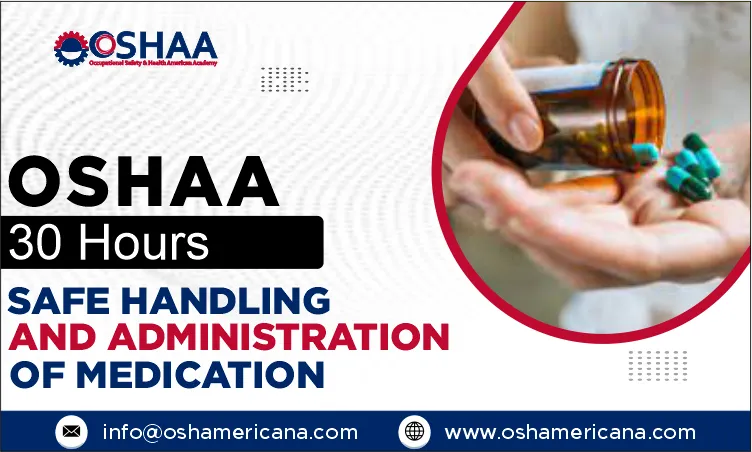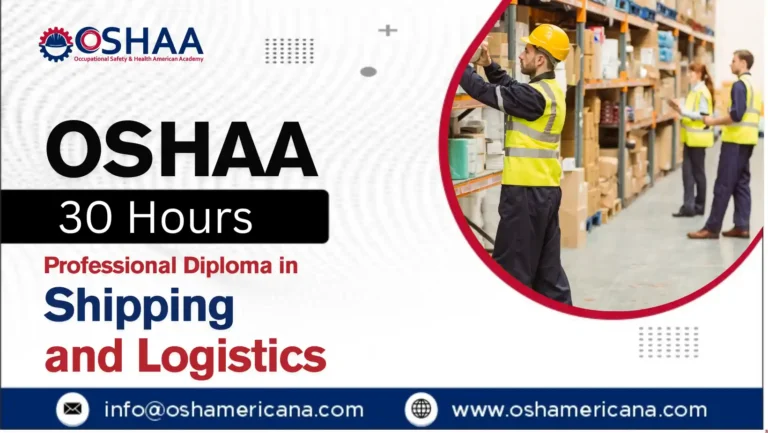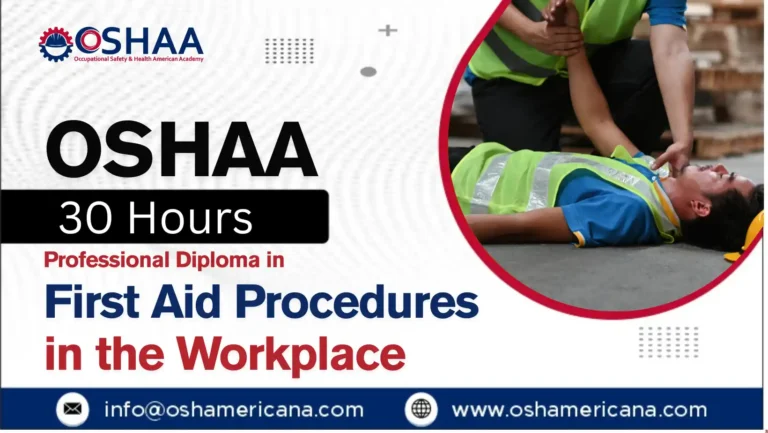Enhance patient safety with the OSHAA 30-Hours Safe Handling and Administration of Medication course. Gain essential skills to prevent errors and ensure compliance.
The OSHAA 30-Hours Safe Handling and Administration of Medication is a comprehensive professional training program designed to equip healthcare professionals with the critical skills and knowledge required to ensure safe, accurate, and compliant medication practices. Medication management is one of the most essential responsibilities in modern healthcare, as errors in handling or administration can lead to severe consequences, including adverse drug reactions, patient harm, and legal implications. By enrolling in the OSHAA 30-Hours Safe Handling and Administration of Medication, participants gain the confidence and competence to deliver safe, high-quality patient care while meeting global safety standards.
In today’s healthcare environment, the safe handling and administration of medication represent the cornerstone of patient wellbeing and organizational trust. Mistakes such as incorrect dosages, wrong prescriptions, or improper storage not only compromise patient health but can also damage the reputation of healthcare facilities and result in regulatory penalties. The OSHAA 30-Hours Safe Handling and Administration of Medication course addresses these challenges by providing detailed, structured training on best practices, compliance requirements, and safety measures that directly reduce risks and enhance patient outcomes. Through advanced instruction, healthcare professionals learn to recognize potential errors, implement preventive strategies, and uphold the highest standards of medication safety in clinical settings.
The OSHAA 30-Hours Safe Handling and Administration of Medication ensures that learners understand the principles of safe prescribing, dispensing, and monitoring medications across various healthcare environments, including hospitals, care homes, rehabilitation centers, and community health practices. It emphasizes compliance with OSHA standards and international healthcare regulations, ensuring participants not only meet but exceed professional requirements. By integrating practical knowledge with theoretical foundations, this course strengthens the professional capacity of healthcare workers to manage medications effectively, minimize risks, and improve patient satisfaction.
For healthcare professionals, this training is more than just an educational requirement; it is a vital investment in professional development and career advancement. Completing the OSHAA 30-Hours Safe Handling and Administration of Medication demonstrates a commitment to excellence in patient care, compliance with international safety standards, and leadership in healthcare quality. It prepares professionals to take on greater responsibilities within their organizations, positioning them as trusted experts in safe medication management.
The OSHAA 30-Hours Safe Handling and Administration of Medication ultimately empowers participants with advanced skills that improve operational efficiency, reduce incidents of medication-related errors, and ensure a culture of safety within healthcare institutions. With its focus on compliance, safety, and professional growth, this program is essential for healthcare workers dedicated to maintaining the highest levels of patient care and safety in their practice.
OSHAA 30-Hours Safe Handling and Administration of Medication
To enroll in the OSHAA 30-Hours Safe Handling and Administration of Medication, learners are expected to meet the following criteria:
1. Age Requirement
- Applicants must be at least 18 years of age to register for the OSHAA 30-Hours Safe Handling and Administration of Medication.
- This ensures learners have the maturity and professional responsibility required to engage with healthcare safety training.
- Meeting the minimum age requirement aligns with international training standards and regulatory expectations for healthcare compliance.
2. Educational Background
- A minimum of a high school diploma or equivalent qualification is recommended for enrolling in the OSHAA 30-Hours Safe Handling and Administration of Medication.
- Higher education in nursing, healthcare, or life sciences is considered an advantage as it provides learners with a stronger foundation to understand medical protocols and patient care standards.
- The course is designed to be accessible to a wide range of healthcare workers while maintaining professional rigor.
- By requiring a solid educational background, the program ensures learners can fully benefit from advanced medication safety practices taught in the OSHAA 30-Hours Safe Handling and Administration of Medication.
3. Work Experience
- Prior healthcare or clinical work experience is not mandatory to participate in the OSHAA 30-Hours Safe Handling and Administration of Medication, making it suitable for both new entrants and experienced professionals.
- However, previous exposure to healthcare environments, such as hospitals, clinics, or long-term care facilities, is recommended to better contextualize course material.
- For experienced healthcare staff, the program strengthens existing knowledge of medication safety and compliance, while for beginners it provides essential training to build competence.
- The flexibility of this requirement allows the OSHAA 30-Hours Safe Handling and Administration of Medication to serve as both an entry-level qualification and a professional development pathway.
4. English Proficiency
- Learners enrolling in the OSHAA 30-Hours Safe Handling and Administration of Medication must have the ability to read, write, and communicate effectively in English.
- English proficiency is necessary to understand technical course materials, international safety guidelines, and regulatory requirements.
- Strong communication skills also ensure that learners can implement medication safety protocols effectively in real-world healthcare settings.
- Proficiency in English supports learners in meeting OSHA compliance standards and enhances their ability to apply knowledge gained from the OSHAA 30-Hours Safe Handling and Administration of Medication in global healthcare environments.
By setting these eligibility requirements, the OSHAA 30-Hours Safe Handling and Administration of Medication ensures that participants are prepared to successfully complete the training, apply advanced skills in safe medication handling, and contribute to higher standards of patient safety, regulatory compliance, and professional excellence in healthcare.
Study Units
Learning Outcomes
The OSHAA 30-Hours Safe Handling and Administration of Medication has been carefully designed to provide learners with advanced skills, compliance knowledge, and safety leadership abilities essential for professional healthcare practice. The course equips participants with the expertise needed to ensure patient safety, minimize risks, and uphold global standards of medication management. By completing the OSHAA 30-Hours Safe Handling and Administration of Medication, learners will be able to apply best practices, align with OSHA and international healthcare regulations, and demonstrate professional competence in medication handling and administration across various healthcare environments.
1. Introduction to Medication Safety (3 hours)
- Gain a comprehensive understanding of the importance of medication safety within healthcare environments.
- Identify common causes of medication errors and strategies to prevent them effectively.
- Develop awareness of global healthcare regulations and OSHA standards related to medication safety.
- Understand the direct impact of safe handling practices on patient outcomes and healthcare quality.
2. Types of Medications and Dosage Forms (5 hours)
- Recognize different categories of medications and their clinical applications.
- Identify various dosage forms such as tablets, capsules, injections, and liquid medications, along with their appropriate uses.
- Learn the pharmacological implications of dosage forms on patient care and treatment effectiveness.
- Apply knowledge of medication types to ensure accurate selection, preparation, and administration in compliance with best practices taught in the OSHAA 30-Hours Safe Handling and Administration of Medication.
3. Medication Prescriptions and Labels (4 hours)
- Interpret medication prescriptions accurately, including abbreviations, measurements, and physician instructions.
- Analyze and understand medication labels, packaging, and manufacturer guidelines to ensure compliance and accuracy.
- Recognize potential errors in prescriptions and labels to prevent risks and ensure patient safety.
- Strengthen the ability to follow legal and professional standards related to prescription verification as emphasized in the OSHAA 30-Hours Safe Handling and Administration of Medication.
4. Safe Medication Storage and Handling (4 hours)
- Understand best practices for storing medications under proper environmental conditions.
- Learn the importance of inventory management, segregation of high-risk medications, and expiry date monitoring.
- Apply OSHA standards for handling hazardous substances and controlled medications safely.
- Enhance organizational compliance by implementing storage protocols that minimize contamination and ensure medication effectiveness.
5. The Five Rights of Medication Administration (3 hours)
- Master the Five Rights: right patient, right medication, right dose, right route, and right time.
- Develop the ability to apply these principles consistently in practical healthcare settings.
- Learn how adherence to the Five Rights prevents critical errors and ensures regulatory compliance.
- Reinforce patient trust and organizational credibility through consistent application of safety practices taught in the OSHAA 30-Hours Safe Handling and Administration of Medication.
6. Medication Administration Techniques (5 hours)
- Acquire hands-on knowledge of different administration routes including oral, intravenous, intramuscular, and topical applications.
- Understand the technical procedures for safe administration while reducing risks of adverse reactions.
- Learn patient-centered approaches to administering medication with empathy and professionalism.
- Apply standardized techniques that align with OSHA regulations and international best practices in healthcare delivery.
7. Patient Monitoring and Post-Administration Care (3 hours)
- Gain expertise in observing and evaluating patients after medication administration.
- Identify signs of adverse reactions, drug interactions, and complications for timely intervention.
- Learn appropriate documentation practices for post-administration monitoring.
- Strengthen professional responsibility in ensuring patient well-being through continuous care and vigilance.
8. Legal and Ethical Considerations in Medication Handling (3 hours)
- Understand the legal responsibilities of healthcare professionals in safe medication administration.
- Learn about ethical principles guiding medication safety, patient rights, and informed consent.
- Recognize the legal consequences of negligence or malpractice in medication handling.
- Apply a strong ethical framework to daily practice, ensuring compliance with OSHA, healthcare laws, and organizational standards.
By completing the OSHAA 30-Hours Safe Handling and Administration of Medication, participants will achieve the skills, knowledge, and confidence required to excel in professional healthcare environments. This course not only prepares learners to follow strict compliance measures but also empowers them to lead safety initiatives, improve workplace efficiency, and build a culture of patient-centered care. With advanced training in medication handling, administration techniques, and regulatory awareness, the OSHAA 30-Hours Safe Handling and Administration of Medication ensures participants are fully prepared to support safer healthcare systems, reduce risks, and drive excellence in patient outcomes globally.
The OSHAA 30-Hours Safe Handling and Administration of Medication provides healthcare professionals with essential knowledge and practical skills to manage medications safely, reduce errors, and enhance patient care. This course benefits participants by equipping them with advanced competencies, ensuring compliance with regulatory requirements, and fostering professional development across healthcare settings. It is designed to enhance operational efficiency, safeguard patient wellbeing, and support healthcare organizations in achieving excellence in medication management practices globally.
1. Advanced Knowledge in Medication Safety
- Gain comprehensive understanding of medication safety principles, including safe handling, administration, and monitoring.
- Apply evidence-based practices to prevent medication errors and adverse drug events.
- Strengthen professional credibility through mastery of safe medication protocols.
2. Regulatory Compliance and Legal Protection
- Learn to comply with OSHA regulations, healthcare laws, and industry standards related to medication management.
- Understand legal responsibilities in medication administration, reducing risk of litigation and professional liability.
- Implement compliance strategies that protect both patients and healthcare organizations.
3. Workplace Safety and Risk Reduction
- Develop skills to identify and mitigate risks associated with medication handling.
- Enhance patient and staff safety by minimizing errors and preventing incidents related to medication mismanagement.
- Apply risk assessment techniques to maintain a safe healthcare environment.
4. Professional Development and Career Advancement
- Enhance professional credentials by gaining a recognized certification in medication safety.
- Acquire competencies that improve employability and career progression in healthcare sectors.
- Demonstrate leadership in safe medication administration, positioning yourself as a subject matter expert.
5. Practical Skills in Medication Handling
- Master techniques for correct storage, dosage calculation, and administration of various medication types.
- Develop hands-on expertise in oral, intravenous, and other administration routes.
- Improve patient outcomes through precise and effective medication management.
6. Enhanced Patient Care and Wellbeing
- Promote patient-centered care by reducing medication-related complications.
- Improve patient satisfaction and trust through adherence to safety protocols.
- Ensure optimal therapeutic outcomes by integrating best practices into daily healthcare routines.
7. Cost Savings and Operational Efficiency
- Reduce healthcare costs by preventing medication errors and associated adverse events.
- Streamline medication management processes, enhancing efficiency and resource utilization.
- Minimize wastage through proper storage, handling, and monitoring practices.
8. Leadership and Team Collaboration
- Build leadership skills in guiding teams to maintain high standards in medication administration.
- Foster effective communication among healthcare staff to ensure accurate and safe practices.
- Encourage collaborative approaches to problem-solving in clinical settings.
9. Emergency Preparedness and Critical Response
- Equip participants to respond effectively to medication-related emergencies and adverse reactions.
- Develop protocols for rapid intervention, ensuring patient safety during critical situations.
- Strengthen confidence in managing unexpected events in healthcare environments.
10. Continuous Improvement and Innovation
- Learn strategies for ongoing improvement in medication safety practices.
- Integrate innovative tools and technologies for monitoring and administering medications safely.
- Promote a culture of continuous learning and quality enhancement within healthcare organizations.
11. Ethical and Professional Standards
- Understand ethical considerations in medication handling, including patient consent and confidentiality.
- Align daily practices with professional and regulatory standards to maintain trust and accountability.
- Ensure decisions support both patient safety and organizational integrity.
12. Global Relevance and Applicability
- Apply knowledge and skills in diverse healthcare settings worldwide.
- Ensure compliance with international standards and best practices for medication management.
- Enhance the ability to work across multidisciplinary teams with global safety standards in mind.
13. Documentation and Reporting Excellence
- Master accurate record-keeping for medication administration, storage, and monitoring.
- Improve accountability and transparency in clinical practice.
- Support organizational reporting systems for quality assurance and audit purposes.
14. Reduced Risk of Medication-Related Adverse Events
- Identify high-risk medications and implement safeguards to prevent errors.
- Monitor patient responses and intervene promptly to avoid complications.
- Contribute to safer healthcare delivery through evidence-based medication practices.
15. Organizational Reputation and Trust
- Strengthen the reputation of healthcare organizations by ensuring high standards in medication safety.
- Build stakeholder trust by demonstrating commitment to patient safety and regulatory compliance.
- Promote a culture of excellence in clinical care, enhancing overall organizational performance.
Completing the OSHAA 30-Hours Safe Handling and Administration of Medication equips healthcare professionals with the critical skills, knowledge, and confidence required to lead medication safety initiatives, ensure compliance with legal and ethical standards, and foster a robust culture of patient-centered care. This course empowers participants to reduce errors, improve operational efficiency, and drive excellence in healthcare outcomes globally, positioning them as leaders in safe medication management.
The OSHAA 30-Hours Safe Handling and Administration of Medication course is designed for healthcare professionals who are involved in medication management, administration, and patient care. It is suitable for individuals in various roles within healthcare settings, including:
- Nurses and Nurse Practitioners
Nurses in hospitals, clinics, and community settings who are responsible for administering medications and ensuring patient safety. - Healthcare Assistants and Support Workers
Healthcare assistants who assist in the administration of medications and need to ensure safe handling practices. - Doctors and Medical Practitioners
Physicians who prescribe medications and need a thorough understanding of medication administration, storage, and safety protocols. - Pharmacists and Pharmacy Technicians
Pharmacists involved in dispensing medications and pharmacy technicians who assist in the preparation and administration of medication. - Care Home Staff
Care home workers and managers who are responsible for the safe handling and administration of medications for elderly or vulnerable patients. - Healthcare Managers and Administrators
Professionals overseeing medication safety protocols and ensuring that staff are properly trained in safe medication handling. - Clinical Educators and Trainers
Individuals responsible for educating and training healthcare teams in medication administration and safety practices. - Allied Health Professionals
Physiotherapists, occupational therapists, and other allied health professionals who may be involved in supporting medication administration or patient care.
This course is ideal for anyone working in healthcare who is looking to improve their medication safety practices, ensure compliance with regulations, and enhance the quality of care they provide to patients.







